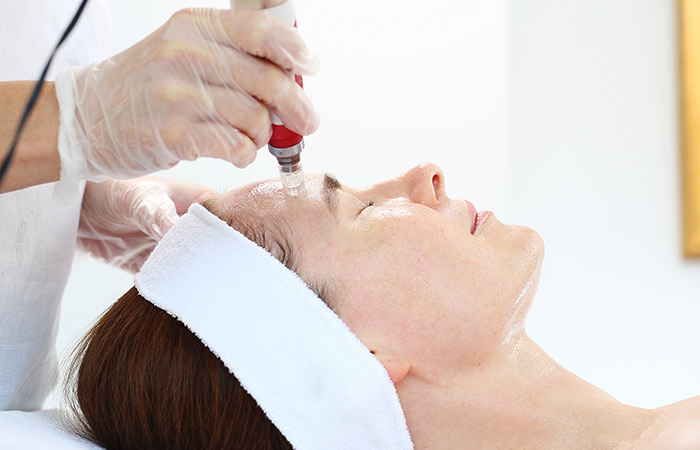Facial mesotherapy is a minimally invasive cosmetic procedure that has gained popularity in recent years as a rejuvenating and skin-enhancing treatment. This innovative approach to skincare involves the injection of a specialized cocktail of vitamins, minerals, amino acids, and hyaluronic acid into the skin’s mesodermal layer, located just beneath the surface. The goal of facial mesotherapy is to improve skin quality, reduce signs of aging, and address various dermatological concerns without the need for surgery. In this article, we will explore the benefits, procedure, and considerations surrounding facial mesotherapy.
The Benefits of Facial Mesotherapy
- Skin Rejuvenation:
Facial mesotherapy stimulates collagen and elastin production, two proteins responsible for skin elasticity and firmness. This leads to a more youthful and rejuvenated appearance.
- Improved Skin Texture:
Mesotherapy can help smooth rough skin texture, reduce the appearance of fine lines and wrinkles, and diminish acne scars.
- Hydration:
The procedure hydrates the skin by delivering hyaluronic acid, a naturally occurring substance that helps retain moisture. This results in plumper, more supple skin.
- Even Skin Tone:
Mesotherapy can target hyperpigmentation, melasma, and uneven skin tone, promoting a more even complexion.
- Reduced Pore Size:
By tightening the skin, mesotherapy can make pores appear smaller and less noticeable.
- Non-Invasive:
Unlike surgical procedures, facial mesotherapy is non-invasive and requires minimal downtime. Patients can return to their daily activities shortly after treatment.
The Facial Mesotherapy Procedure
- Consultation:
The process begins with a consultation with a qualified and experienced medical professional. During this consultation, the patient’s skin condition, concerns, and treatment goals are discussed.
- Treatment Plan:
Based on the assessment, the practitioner develops a customized treatment plan that outlines the areas to be treated and the number of sessions required for optimal results.
- Preparation:
Before the procedure, the patient’s skin is cleansed thoroughly, and a topical anesthetic may be applied to minimize discomfort during the injections.
- Injection:
Using a fine needle or a mesotherapy gun, the practitioner administers the specially formulated solution into the target areas. The injections are typically shallow, targeting the mesoderm, which is just beneath the skin’s surface.
- Post-Treatment Care:
After the procedure, patients may experience mild redness, swelling, or bruising, but these side effects are usually temporary and subside within a few days. Patients are advised to avoid sun exposure, strenuous exercise, and certain skincare products immediately following treatment.
- Follow-up Sessions:
Depending on the treatment plan, patients may require a series of sessions spaced several weeks apart to achieve the desired results. Maintenance sessions are often recommended to prolong the effects.
Considerations and Safety
Facial mesotherapy is generally considered safe when performed by a trained and licensed professional. However, like any cosmetic procedure, there are some considerations to keep in mind:
– Consultation:Always consult with a qualified practitioner to determine if you are a suitable candidate for facial mesotherapy.
– Provider Selection: Choose a reputable and experienced practitioner who uses FDA-approved products and follows strict hygiene and safety protocols.
– Expectations: Understand that the results of facial mesotherapy may vary from person to person, and it may take multiple sessions to achieve the desired outcome.
– Side Effects: While side effects are typically mild and short-lived, there is a risk of infection, scarring, or an adverse reaction to the injected solution. It’s essential to follow post-treatment care instructions and report any unusual symptoms to your provider.
Facial mesotherapy offers a non-surgical alternative for those seeking to improve their skin’s appearance and combat signs of aging. It’s essential to research and consult with a qualified practitioner to determine if this treatment aligns with your skincare goals and needs. When performed correctly, facial mesotherapy can help you achieve smoother, more youthful, and radiant skin without the need for invasive surgery.
What is the difference between mesotherapy and microneedling?
Mesotherapy and microneedling are both cosmetic procedures that target the skin to address various concerns, but they differ in their techniques, purposes, and how they work.
Mesotherapy:
- Technique: Mesotherapy involves the injection of a specialized cocktail of vitamins, minerals, amino acids, and hyaluronic acid directly into the skin’s mesodermal layer, which is just beneath the surface. The injections are typically administered using fine needles or a mesotherapy gun.
- Purpose:Mesotherapy is primarily used to rejuvenate the skin, stimulate collagen and elastin production, and address specific skin concerns such as fine lines, wrinkles, uneven skin tone, and hydration. It can also target localized fat deposits and cellulite reduction in some cases.
- Customization: The mesotherapy solution can be customized to address the patient’s specific skin issues, and the treatment plan is tailored to individual needs.
- Downtime: Mesotherapy may involve some downtime, such as redness, swelling, or bruising, which typically subsides within a few days. However, it is less invasive than some other procedures and generally requires less recovery time than surgical options.
Microneedling:
- Technique: Microneedling, also known as collagen induction therapy, uses a device with tiny, fine needles to create micro-injuries in the skin’s surface. These micro-injuries stimulate the skin’s natural healing process and collagen production.
- Purpose: Microneedling is primarily used to improve the skin’s texture and appearance, reduce fine lines and wrinkles, minimize acne scars, and enhance overall skin tone and elasticity. It can also improve the absorption of topical skincare products.
- Customization: Microneedling can be customized with various needle lengths and depths to target specific skin concerns. The procedure can be performed with or without the application of serums or growth factors.
- Downtime: After microneedling, patients may experience redness and mild swelling, similar to mesotherapy. The recovery time is relatively short, and most people can return to their daily activities within a few days.
Key Differences:
- Delivery Method: The most significant difference between mesotherapy and microneedling is the method of treatment delivery. Mesotherapy involves injections of a specialized solution, while microneedling creates micro-injuries in the skin’s surface using a device.
- Treatment Depth:Mesotherapy typically targets the mesodermal layer just beneath the skin’s surface, while microneedling can be adjusted to penetrate different depths of the skin, depending on the desired outcome.
- Purpose: Mesotherapy is often used for a broader range of concerns, including skin rejuvenation, hydration, and localized fat reduction. Microneedling is primarily focused on improving skin texture, minimizing scars, and enhancing collagen production.
- Customization: Both treatments can be customized to address specific skin concerns, but microneedling allows for more precise control over the depth of treatment.
In summary, while both mesotherapy and microneedling offer non-surgical solutions to improve the skin’s appearance, they use different techniques and have varying primary purposes. The choice between these treatments depends on your specific skin concerns and goals, and it’s advisable to consult with a qualified skincare professional to determine which option is best suited for you.
mesotherapy for face side effects
Mesotherapy for the face is generally considered safe when performed by a trained and qualified healthcare provider. However, like any medical procedure, it carries some potential side effects and risks. It’s essential to be aware of these side effects and discuss them with your provider before undergoing mesotherapy. Here are some of the common side effects associated with facial mesotherapy:
- Redness and Swelling: After the procedure, it’s normal to experience redness and swelling at the injection sites. This usually subsides within a few hours to a few days. Applying ice packs or a soothing topical cream can help alleviate these symptoms.
- Bruising: Some patients may develop minor bruising at the injection sites. This is typically temporary and can be concealed with makeup if desired.
- Pain or Discomfort: Mild discomfort or pain at the injection sites is common. Your provider may apply a topical numbing cream before the procedure to minimize any discomfort during the injections.
- Itching or Tingling: You may experience itching or tingling sensations in the treated areas. This is usually temporary and should resolve on its own.
- Skin Sensitivity:The treated skin may be more sensitive to touch immediately after mesotherapy. Avoid excessive rubbing or scratching to prevent irritation.
- Infection:Although rare, there is a risk of infection at the injection sites. It’s crucial to keep the treated areas clean and follow post-treatment care instructions to reduce this risk.
- Allergic Reaction: Some individuals may be sensitive or allergic to the ingredients in the mesotherapy solution. It’s important to discuss any known allergies or sensitivities with your provider before the procedure.
- Uneven Results: While mesotherapy can yield excellent results, individual responses may vary. It may take several sessions to achieve the desired outcome, and results are not guaranteed.
- Hyperpigmentation or Hypopigmentation: In rare cases, mesotherapy may lead to changes in skin pigmentation. Hyperpigmentation (darkening of the skin) or hypopigmentation (lightening of the skin) can occur, especially in individuals with a predisposition to these issues.
- Scarring: Although uncommon, there is a risk of scarring at the injection sites. This risk can be minimized by choosing an experienced and skilled provider who follows proper hygiene and safety protocols.
It’s crucial to have a thorough consultation with your healthcare provider before undergoing facial mesotherapy. During this consultation, discuss your medical history, any previous cosmetic treatments, and your expectations. Your provider can assess whether you are a suitable candidate for mesotherapy and explain the potential risks and benefits.
To minimize the risk of side effects and ensure the best possible outcome, choose a qualified and reputable provider who uses FDA-approved products and follows strict safety and hygiene practices. Additionally, carefully follow post-treatment care instructions provided by your provider to support the healing process and optimize your results.





